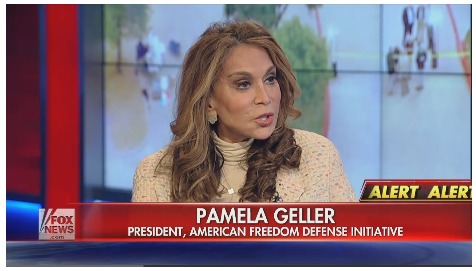Far-right provocateur Pamela Geller was certainly looking to cause controversy by holding a "Draw the Prophet" cartoon contest in Garland, Texas on May 3. But things went much further than stirring debate; two gunmen fired at a security officer outside the event, and then were shot dead by a traffic officer.
What's happened since has been a "free speech versus hate speech" debate, with some arguing that Geller's provocations are somehow less deserving of legal protection.
The 'draw Muhammad' contest, Geller has said all along, was intended to demonstrate the value of free speech. And it's no mystery what she thinks; over the years, she has raised doubts about Barack Obama's birth certificate and claims he "wants jihad to win."
She is of course free to believe any of these things, and to express herself publicly without the fear of violence.
But the New York Times editorial page attempted to draw a line, writing that Geller's Texas event "was not really about free speech," but "an exercise in bigotry and hatred posing as a blow for freedom." Holding such a contest was a "blatantly Islamophobic provocation," and the cartoons are "inflicting deliberate anguish on millions of devout Muslims who have nothing to do with terrorism."
The Times even seems to argue that Geller sought violence, writing that she "achieved her provocative goal in Garland." This demonstrates a disappointing confusion about the whole matter of free speech.
The Los Angeles Times struck the right balance on its editorial page, writing that the fact that Geller has made provocative statements "in no way undermines her right to free speech or legitimizes violence against her or anyone else."
They add:
You can deplore Geller's words — as we do — and still recognize that she is entitled to express them without fear of violent reprisals or concern that she is violating the law. It's not only possible but necessary to insist on that distinction.
That seems like an obvious and important distinction.
But one shouldn't confuse the willingness to exercise free speech with a commitment to defend the free speech rights of others. Geller has been a leading figure in protests against the building of mosques and Islamic cultural centers in New York; she gained national prominence in 2007 as part of the "Stop the Madrassa" protests against Debbie Almontaser, the founding principal of a secular Arabic-language public school in Brooklyn who wound up resigning because of the controversy. The AP noted, in 2009 she wrote that "devout Muslims should be prohibited from military service. Would Patton have recruited Nazis into his army?"
So she is not exactly a free expression advocate. As Max Fisher of Vox put it, Geller has "focused on curbing the rights, including the speech rights, of Muslims in the United States." The keynote speaker at the Texas event, Dutch political figure Geert Wilders, has long advocated banning the Koran.
And the platform for Geller's organization, The American Freedom Defense Initiative, spells this out more clearly, advocating for "profiling of Muslims at airports and in hiring in professions in which national security and public safety could be compromised" and increased surveillance and "regular inspections" of mosques.
These are staunchly anti-speech positions. Free speech advocates, though, should appreciate that however controversial and unsettling Geller's views might be, she has the right to express those views in public without fear of being shot.


